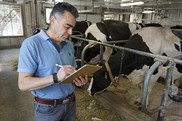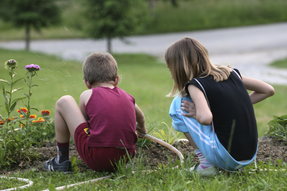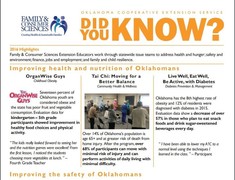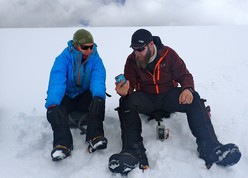|
Having trouble viewing this email? View it as a Web page.

|
|
|
Fresh from the Field is a weekly album showcasing transformative impacts made by grantees supported by the National Institute of Food and Agriculture.
September 7, 2017
|
|
Be prepared
September is National
Preparedness Month. NIFA provides funding for disaster education with the Food
and Agriculture Defense Initiative through the Extension Disaster Education Network (EDEN).
EDEN is a national network with land and sea grant universities staff of Cooperative
Extension Services across the country. EDEN's goal is to
improve the nation's ability to mitigate, prepare for, prevent, respond to, and
recover from disasters. EDEN equips county-based extension educators with
research-based resources in local disaster management and recovery efforts. The
EDEN website offers a searchable database of extension professionals,
resources, member universities and disaster agency websites, education
materials to help people deal with a wide range of hazards, food and agricultural
defense educational resources and outcomes. Mississippi State University has taken a system-wide approach to
disaster preparedness, including having their staff complete select Incident
Command System training through the Federal Emergency Management Agency.
Visit the USDA Disaster Resource Center website
for additional information on USDA preparedness resources.
 Helping hands in Missouri
Limited-resource small
farmers in the state of Missouri are often unaware of government resources and
funding opportunities available to them. Lincoln University in Jefferson
City, Missouri, launched the Innovative Small Farmers’ Outreach Program (ISFOP)
to address the needs of small and limited-resource farmers and ranchers so that
they can have a better quality of life.
In 2015, the ISFOP
provided outreach to 288 families. Of this number, 180 families reported an
average income increase of $2,464 per farm.
NIFA supports this
outreach through Lincoln University Cooperative Extension (LUCE).
Read more at Lincoln University's website. Image provided by iStock.
|
 Making big data work better
on the farm
Dairy farms are using many
technologies to collect data on their operations, but those systems often don’t
talk to each other. This impedes farmers’ ability to use the data to make the
best possible management decisions.
A multidisciplinary team
of University of Wisconsin (UW) scientists led by Victor Cabrera
has set out to create a “virtual dairy farm brain” that will collect and
integrate all of a farm’s data streams in real time and then use artificial
intelligence to analyze those data to help farmers run their businesses.
The UW team, which
includes dairy scientists, agricultural economists and computer scientists, is
collecting data from 4,000 cows in three Wisconsin herds. The system is
collecting data on dairy operations from sire records, feed consumed, milk
produced, weather conditions, and the price of milk. The data is sent to a
campus-based server, which will then filter the information, and create
intuitive, cloud-based decision-support tools for farmers.
NIFA supports this
research through the Multistate Research Fund.
Read the UW article. Image provided by
Ted Halbach-UW-Madison.
|
News Coverage
 Youth safety in New Mexico
Each year, more than nine
million children go to emergency departments for unintentional injury according
to the Center for Disease Control and Prevention. Eastern New Mexico was
faced with a series of accidental deaths and accidents resulting in severe
injuries to youth. In response, New Mexico State University
Cooperative Extension Service created Safety Days in 2000 to reduce injuries to
children.
Safety Days are held for
all third graders across the eleven counties of Eastern New Mexico. These
one-day events teach children safety lessons for use at home, on a farm, or
ranch. Activities include how and when to make 911 calls for help; how to be
safe around household chemicals, electricity, water, farm equipment and
lawnmowers; and learn first aid.
In 2016, Safety Days
reached more than 5,000 students and teachers annually in the 11 eastern
counties.
NIFA supports the program
through the Smith Lever Act.
Read more about NMSU Extension. Image provided by
iStock.
|
The Library
 Reaching out in Oklahoma
Oklahoma has the eighth
highest rate of obesity in the nation, with12 percent of residents being diagnosed
with diabetes in 2015. “Live Well, Eat Well, Be Active with Diabetes” began in 2015 as one of
several classes offered through the Family & Consumer Sciences Extension
at Oklahoma State University (OSU).
OSU Extension works
through statewide issue teams to address health and hunger; safety and
environment; finance, jobs and employment; and family and child resilience. In
2016, class evaluation data revealed a 57 percent decrease in those who planned
to eat snack foods and drink sugar-sweetened beverages.
Learn more about OSU Extension with this infographic.
|
Video
 Follow a researcher
Students in Maine and
several other states can now take part in global research expeditions from the
comfort of their classrooms. The University of Maine 4-H “Follow a
Researcher” program uses technology and social media to connect youth and
graduate student researchers working in remote locations around the world with
field researchers. More than 4,200 youth and over 120 educators have engaged with
three different researchers during the researchers’ expeditions to Peru, the
Falkland Islands, and Antarctica.
Watch the Follower a Researcher video. Image provided by
Catherine Hamley and Charles Rodda.
|
Tweet of the Week
#NIFAIMPACTS
|
|

NIFA’s mission is
to invest in and advance agricultural research, education, and extension that
solve societal challenges. NIFA’s investments in transformative science
directly support the long-term prosperity and global preeminence of U.S.
agriculture. To learn more about NIFA’s impact
on agricultural sciences,
visit www.nifa.usda.gov/Impacts, sign up for email updates or follow us on Twitter @USDA_NIFA, #NIFAImpacts.
###
USDA is an equal opportunity lender, provider, and
employer.
Editor: Falita Liles
|
|